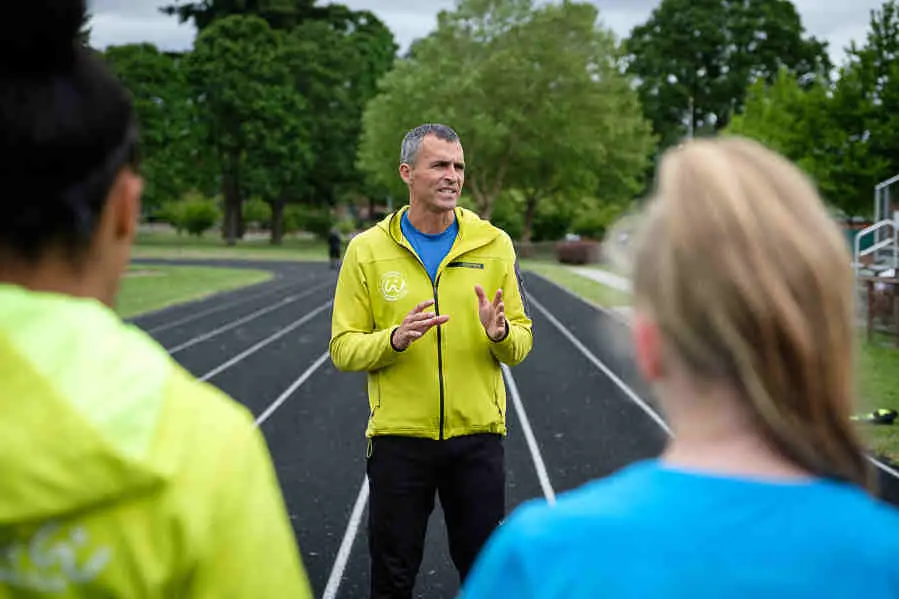Table of Contents

Helping an athlete develop or deepen their motivation to change in a positive direction is often a goal when working with a sports psychologist. As much as athletes may desire change they often must confront some aversions to change. A sports psychologist can assist athletes with moving forward by using motivational interviewing.
*This post may contain affiliate links. As an Amazon Associate we earn from qualifying purchases.
Motivational Interviewing – The Basics
Motivational interviewing has roots in humanistic theories of change and is about an approach as well as using certain techniques that can be helpful for persons wanting to change. The humanistic and positive psychology approaches emphasize free choice and the idea that each of us is ultimately personally responsible for the behavior and thinking changes that we make. Key ideas are awareness, acceptance of ambivalence and probing for reasons why change might be good. The original ideas of motivational interviewing blossomed out of an appreciation for how it helped individuals dealing with alcohol or drug-related addictions make major changes in their lifestyle.
Motivational Interviewing and the Individual Athlete: Meet Rick
Rick decided to see a sports psychologist because he had made a goal for himself to score or assist with a score in each high school soccer conference game he played. The reason he gave for this goal was that he wanted to get a college scholarship to play Division I soccer. He described getting very tense by the end of the first half if he had not met his goals. He said he found himself watching the time tick away more and more and didn’t know what to do to stop this. His main goal for seeing a sports psychologist was to try to focus more on playing rather than on the time remaining in a game. He also wanted to figure out how to relax more.
Rick explained that he had to be aware of the time in the game because he thought it helped him put pressure on himself to make things happen. In other words, he was somewhat ambivalent about taking his focus off of this. When questioned a little more about why he wanted to make changes he said he was not playing as well as he had the previous year and he was wondering about his focus.
Pillars of Motivational Interviewing In Sports
Rick described a dilemma as he could see the pros and cons of his focus on time. This focus was related to his game goals of scoring or assisting on a score.
For change to be successful, the mind needs to acquire the awareness that it needs change. If we have mixed feelings about change, or someone else is suggesting we change, our stubborn side can show up, and we can convince ourselves more about the reasons to NOT make change even if things are not quite working out. In addition to awareness, there is the idea of acceptance. Ambivalence to change is normal and athletes need to know this. Accepting ambivalence is okay. It’s part of the process of weighing pros and cons.
Unfortunately, this is when others often try to IMPOSE or CONVINCE others to make changes. And if, for example, Rick changed his focus because the coach or sports psychologist told him he had to do this, then if it doesn’t go well the first few times the athlete can blame others and say the changes didn’t work. But when someone personally arrives at reasons for a change and is educated on change taking time then he may commit and work through some of the challenges because it was a decision this person arrived at personally. Good questions and good listening are key in this process.

Motivational Interviewing and Teams: Changing Mindsets of Losing Teams
As important as training and game preparation are, the mental mindset of an athlete can be even more compelling. Nearly everyone in the sports world, fan, and competitor alike has witnessed the baffling tendency of a team seemingly destined to always lose. It’s a mental quagmire that when loss after loss begins to pile up, athletes can develop a mindset that says something like “this is who we are” and “this is what others expect” and “we just cannot win”.
Changing the “once a loser, always a loser” mental outlook can be a daunting task for any coach. But, motivational interviewing techniques can be helpful in promoting change and growth mindset in athletes. So one core feature of motivational interviewing that a coach might want to use is asking questions that help his or her team look forward and not so much about past history.
Who do we want to be?
What are our reasons for wanting to change?
How would you play if you were NOT trying to prove something?
What skills would you work on that would help make change possible?
Looking backward does nothing but embed the athlete’s negative view of the situation. On the other hand, looking too far into the future makes change seem like climbing an insurmountable cliff. The idea is to help athletes be more present-focused as they work toward change.
While the underlying reasons for consistently losing sports contests certainly could have some basis in the talent level, it is important to remember that poor mental images held by the team, about themselves, are not productive. This poor self-image bleeds into practice and training. A bad team that practices poorly and doesn’t see any sense in training is going to continue to be a bad team.
Motivational tools can help improve a team’s personal perception of themselves and help them see the reasons for more of a present focus, and connect changes wanted with training and work ethic.
Motivational interviewing is an influential approach to help athletes work through ambivalence about change by addressing mindset and connecting reasons to them personally. The other idea is to help athletes see, through questioning, why making changes are positive for them.
IMAGE SOURCE: 1, 2
